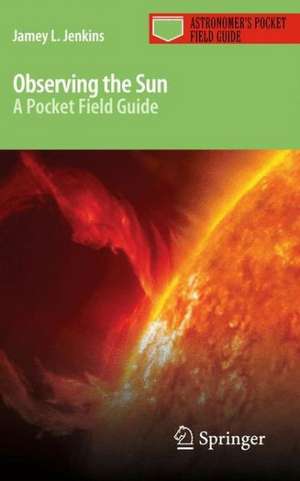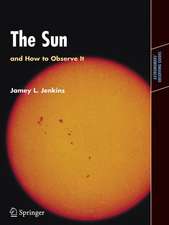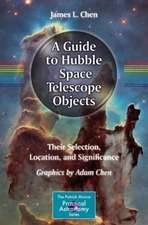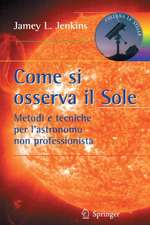Observing the Sun: A Pocket Field Guide: Astronomer's Pocket Field Guide
Autor Jamey L. Jenkinsen Limba Engleză Paperback – 19 iul 2013
The beginning observer is often trying to find a niche or define a specific interest in his hobby, and the content of this book will spark that interest in solar observing because of the focus on the dynamics of the Sun.
Intermediate and advanced observers will find the book invaluable in identifying features (through photos, charts, diagrams) in a logical, orderly fashion and then guiding the observer to interpret the observations.
Because the Sun is a dynamic celestial body in constant flux, astronomers rarely know for certain what awaits them at the eyepiece. All features of the Sun are transient and sometimes rather fleeting. Given the number of features and the complex life cycles of some, it can be a challenging hobby. “Observing the Sun” provides essential illustrations, charts, and diagrams that depict the forms and life cycles of the numerous features visible on the Sun.
Preț: 315.57 lei
Nou
Puncte Express: 473
Preț estimativ în valută:
60.38€ • 62.92$ • 49.100£
60.38€ • 62.92$ • 49.100£
Carte tipărită la comandă
Livrare economică 03-17 aprilie
Preluare comenzi: 021 569.72.76
Specificații
ISBN-13: 9781461480143
ISBN-10: 1461480140
Pagini: 200
Ilustrații: XV, 242 p. 85 illus., 12 illus. in color.
Dimensiuni: 127 x 203 x 15 mm
Greutate: 0.27 kg
Ediția:2013
Editura: Springer
Colecția Springer
Seria Astronomer's Pocket Field Guide
Locul publicării:New York, NY, United States
ISBN-10: 1461480140
Pagini: 200
Ilustrații: XV, 242 p. 85 illus., 12 illus. in color.
Dimensiuni: 127 x 203 x 15 mm
Greutate: 0.27 kg
Ediția:2013
Editura: Springer
Colecția Springer
Seria Astronomer's Pocket Field Guide
Locul publicării:New York, NY, United States
Public țintă
Popular/generalCuprins
The Sun is a Star.- Observe the Sun.- Identify Solar Features.- Record Your Observations.
Notă biografică
This is the second book written by Jamey Jenkins about the Sun. Springer published the first, The Sun and How to Observe It, in 2009 as a comprehensive look at solar observing. That book took a wide-ranging approach, explaining to the amateur astronomer the how and why of studying the nearest star. This venture, Observing the Sun: A Pocket Field Guide is meant for reference use at the telescope with a specific focus on the Sun’s abundant features. A product of the space age during the heyday of the 1960s Gemini and Apollo space programs, his first astronomical explorations led to a succession of increasingly larger telescopes and an invite to write for Dave Eicher’s fledgling amateur journal, Deep Sky Monthly.
Jenkins has contributed to the Sunspot Program of the American Association of Variable Star Observers (AAVSO) and is an active member of the Association of Lunar and Planetary Observers (ALPO) Solar Section. He’s also served as Assistant Section Coordinator of that group for a number of years. Jenkins photographs sunspots, watches calcium clouds, and studies prominence activity from his backyard observatory with a substantial 125 mm f/18 refractor. A significant development from the tiny Galilean lunar telescope of his past, this home-assembled telescope shows the Sun’s unique character, as a seething, boiling caldron of gas, and indeed the master of the solar system.
Jenkins has contributed to the Sunspot Program of the American Association of Variable Star Observers (AAVSO) and is an active member of the Association of Lunar and Planetary Observers (ALPO) Solar Section. He’s also served as Assistant Section Coordinator of that group for a number of years. Jenkins photographs sunspots, watches calcium clouds, and studies prominence activity from his backyard observatory with a substantial 125 mm f/18 refractor. A significant development from the tiny Galilean lunar telescope of his past, this home-assembled telescope shows the Sun’s unique character, as a seething, boiling caldron of gas, and indeed the master of the solar system.
Textul de pe ultima copertă
A comprehensive solar observing guide for use at the telescope by amateur astronomers at all three levels: beginning, intermediate, and advanced. Users will find invaluable information for identifying features through photos, charts, diagrams in a logical, orderly fashion and then interpreting the observations.
Because the Sun is a dynamic celestial body in constant flux, astronomers rarely know for certain what awaits them at the eyepiece. All features of the Sun are transient and sometimes rather fleeting. Given the number of features and the complex life cycles of some solar features, it can be a challenging hobby, and this guide provides all of the guidance necessary to inform observers about the sights and events unfolding before their eyes on the most active and powerful member of our Solar System.
Because the Sun is a dynamic celestial body in constant flux, astronomers rarely know for certain what awaits them at the eyepiece. All features of the Sun are transient and sometimes rather fleeting. Given the number of features and the complex life cycles of some solar features, it can be a challenging hobby, and this guide provides all of the guidance necessary to inform observers about the sights and events unfolding before their eyes on the most active and powerful member of our Solar System.
Caracteristici
Provides a quick reference guide for identifying and classifying features found on the Sun Provides essential illustrations, charts, and diagrams that depict the forms and life cycles of features visible on the Sun Includes instructions on how to observe the Sun safely Includes supplementary material: sn.pub/extras

























